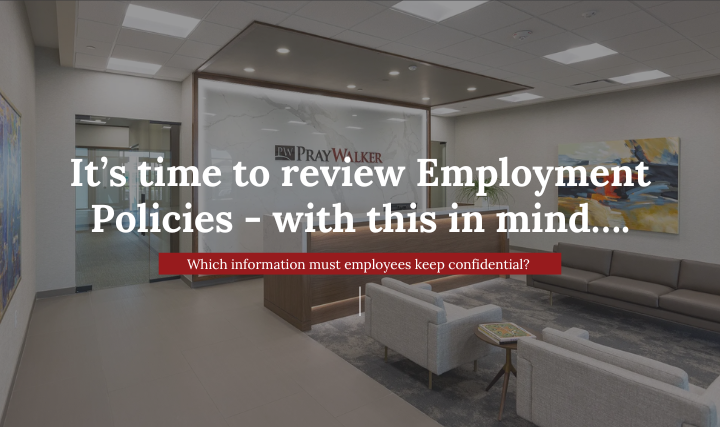
It’s time to review Employment Policies - with this in mind….
The National Labor Relations Board’s (NLRB) recent decision in Stericycle impacts employment policies – even if those policies cover non-union employees. Prior to Stericycle,the NLRB analyzed a work rule or policy by balancing the employer’s business justification with its impact on employee’s rights. Under the Stericycle a rule or policy is presumptively unlawful if an employee could reasonably interpret the rule or policy to limit the employee’s rights under the National Labor Relations Act (NLRA). If the NLRB makes such a finding then the employer may then attempt to put forth a “legitimate and substantial business interest” which cannot be achieved through a narrower rule.
The NLRA and Concerted Activity. The NLRA,as enforced by the NLRB, protects an employee’s right to engage in concerted activity, including the right to communicate with co-workers, raise concerns about working conditions, and collectively bargain over wages, hours, and working conditions. As it did in Stericycle,the NLRB scrutinizes employment policies which may impact these rights.
The NLRB’s standard for interpreting employment policies.The NLRB will examine a policy or work rule from “the perspective of an employee who is subject to the rule and economically dependent on the employer and contemplates engaging in concerted activity.” The NLRB will examine the specific wording of the policy or rule, the specific industry and workplace context in which the rule is maintained, and the specific employer interests the policy or rule advances. In its analysis, the NLRB gives no weight to an employer’s intent in maintaining the rule or policy. If the challenged policy or rule has a reasonable tendency to chill employees from exercising their NLRA rights, then the rule is presumptively unlawful. Any ambiguities or confusion in the work policy or rule will be interpreted against the employer.
In light of the Stericyle decision and the new standard it establishes, employers should review their policies, including those policies concerning:
A. Confidentiality and Anti-harassment. Confidentiality requirements in all policies should be reviewed to ensure they are narrowly drafted to address the specific business need for maintaining the information’s confidentiality. An anti-harassment policy likely violates the NLRB’s new standard if it broadly requires that everyone involved in an internal investigation (including the employee asserting a claim) maintain confidentiality. However, employers and any investigators acting on their behalf should continue to maintain confidentiality except to the extent necessary to ensure an effective investigation. Further, employers should continue to restrict employee dissemination of an employer’s confidential,trade secret, or proprietary information.
B. Personal Conduct. The NLRA does not protect employees who maliciously or intentionally harm their employer’s business or reputation. However, policies broadly restricting conduct which may impact their employer’s reputation are subject to challenge.
C. Conflict of Interest. Policies which attempt to restrict employee behavior because such behavior may adversely reflect on the employer may be overbroad. These types of policies must be narrowly drafted and should include specific examples of prohibited conduct. Policies which could be interpreted as restricting an employee’s right to publicly complain are subject to greater scrutiny under the new NLRB standard announced in Stericycle.
D. Email. An employer is entitled to protect its computer network from viruses and hackers but employees may use work email to engage in protected concerted activity while on break. If an employer grants employees access to email during working time this can also include the right to use the email for protected activity during non-working time.
E. Personal Electronic Devices (Cellphones):Recordings and Cameras. Policies restricting the use of recording devices and cameras are subject to additional scrutiny after the Stericyle decision. Enforcement of policies prohibiting cameras, recording devices, and cell phones will depend upon the employer’s industry and the context of the rule. For example, if national security issues, intellectual property preservation concerns, or the specific circumstances of a work environment justify the policy then those issues and concerns should be identified in the policy. General prohibitions in non-secure areas or during breaks may not be justified under the NLRB’s new standard.
An employer’s defense of the challenged policy. If the NLRB alleges an employment policy violates the NLRA, the policy will be deemed illegal unless the employer “advances a legitimate and substantial business interest and that the employer is unable to advance that interest with a more narrowly tailored rule.” The specific context of a rule and the specific industry in which an employer operates will be important to the analysis.
Recommendations. When considering the implications of the NLRA, consider whether a policy can be read to prohibit an employee from engaging in concerted protected activity. Must employees refrain from discussing their working conditions? Which information must employees keep confidential? Which employees have email accounts and are they prohibited from using the email at all times and for all purposes other than in the performance of their job duties?
If you would like to discuss how to update and revise your work rules and policies or further discuss the implications of the NLRA on the work environment, please contact Pray Walker’s Labor and Employment attorneys.
Kevin Doyle
kdoyle@praywalker.com
Will Jones
wjones@praywalker.com
Bretton Crane
bretton2@praywalker.com
Start a conversation
We’re here to discuss. Drop us a note and a Pray Walker attorney will connect with you.


